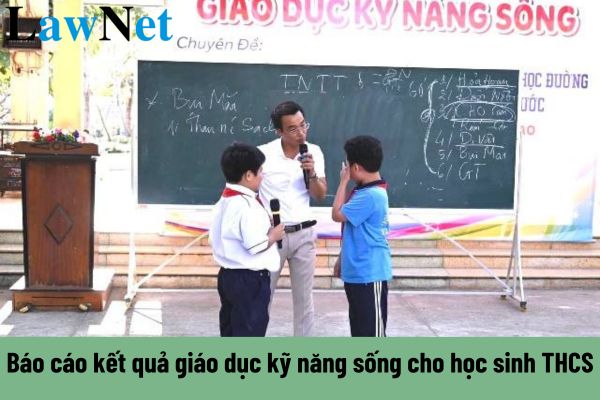What is the newest report template on the life skills education results for lower secondary school students in Vietnam?
What is the newest report template on the life skills education results for lower secondary school students in Vietnam?
The report on the life skills education results for lower secondary school students in Vietnam is a document aimed at summarizing and evaluating the results, progress, and effectiveness of the life skills education programs and activities organized in schools for lower secondary school students. The objective of this report is to reflect the learning process and life skills training of students, assess the level of skill development, and propose improvement measures for the future.
A high-quality report on the life skills education results for lower secondary school students will serve as an important basis for schools to build a comprehensive education program that meets the developmental needs of students in modern society.
| The newest report template on the life skills education results for lower secondary school students in Vietnam I. Objectives: Clearly state the general and specific objectives of the life skills education program for the academic year. Example: Enhance students' awareness of necessary life skills. Train communication, cooperation, problem-solving, and self-discipline skills. Develop ethical qualities and healthy lifestyles. II. Activity Content: Conducted Activities: Extracurricular activities: Life skills clubs, games, real-life situations, etc. Integrate life skills into subjects Organize talks, seminars Experiential activities, field trips Participants: All students in the school Classes/grade levels Special groups (struggling students, students in difficult circumstances) Implementation Methods: Direct teaching Practice, experience Use supportive resources (videos, images, games) Community linkages III. Achieved Results: On Awareness: Students have a clearer understanding of the importance of life skills. Students actively participate in activities. Students' attitudes become more positive in applying life skills to life. On Skills: Students are equipped with basic life skills. Students' communication and teamwork abilities are improved. Problem-solving and decision-making skills of students are enhanced. On Behavior: Students are more confident in communication. Students know how to cooperate with others. Students know how to manage emotions and resolve conflicts. Students are aware of protecting themselves and the community. IV. Difficulties and Limitations: Human resources: Lack of teachers specialized in life skills education. Time: Limited time for life skills education activities. Resources: Lack of supportive resources (books, newspapers, videos, etc.) Parental involvement: Inadequate cooperation between school and family. V. Solutions: Enhance teacher training: Organize training sessions and workshops for teachers on life skills teaching. Develop specific plans: Formulate detailed and specific plans for each activity. Strengthen cooperation: Enhance cooperation between school, family, and community. Use information technology: Apply information technology to teaching and learning life skills. VI. Conclusion: General assessment: Provide an overall evaluation of the achieved results and existing limitations. Development direction: Propose solutions to improve the effectiveness of life skills education in the future. VII. Recommendations: Propose specific solutions: Increase investment in life skills education. Develop a long-term life skills education program. Create opportunities for students to have real-life experiences. Propose supportive policies: Support policies regarding finance and resources. Policies to facilitate teachers' participation in capacity-building activities. |
*Note: The newest report template on the life skills education results for lower secondary school students in Vietnam is for reference only./.

What is the newest report template on the life skills education results for lower secondary school students in Vietnam? (Image from the Internet)
What are the forms of commendation for lower secondary school students in Vietnam?
Under Article 38 of the lower secondary school, upper secondary school and multi-level school charter issued under Circular 32/2020/TT-BGDDT regarding commendation and discipline:
Commendation and Discipline
1. Teachers, secondary schools and education authorities shall commend students with learning and training achievements in the following ways:
a) Commend them in front of the class or the whole school.
b) Grant them titles for students according to regulations.
c) Grant certificates and certificates of merit to students with outstanding achievements or exceptional improvement in learning or emulation movements and competition winners according to regulations and with permission from the Ministry of Education and Training.
d) Other ways to commend.
2. Students making a mistake during the learning and training process shall be corrected or disciplined in the following ways:
a) Give the student a reminder, directly support them in correcting their mistake.
b) Reprimand the student, inform the student’s parent(s) to have the parent(s) cooperate in supporting the student in correcting their mistake.
c) Suspend the student’s study at school for a definite period and take other correcting measures according to regulations from the Ministry of Education and Training.
Thus, lower secondary school students with learning and training achievements are commended by teachers, secondary schools and education authorities in the following forms:
- Commend them in front of the class or the whole school.
- Grant them titles for students according to regulations.
- Grant certificates and certificates of merit to students with outstanding achievements or exceptional improvement in learning or emulation movements and competition winners according to regulations and with permission from the Ministry of Education and Training.
- Other ways to commend.
What are the 07 prohibited acts for lower secondary school students in Vietnam?
According to Article 37 of the lower secondary school, upper secondary school and multi-level school charter issued under Circular 32/2020/TT-BGDDT, the 07 prohibited acts for lower secondary school students in Vietnam include:
1. Disrespect the dignity, honor or bodily integrity of teachers, officials and staff of their schools, other people and other students.
2. Act dishonestly in learning, examinations or admission process.
3. Buy, sell or use alcohol, tobacco, drugs, other stimulants, firecrackers or explosives.
4. Use mobile phones and other devices in class for purposes other than learning and without the teacher's permission.
5. Fight or disrupt public or school order or security.
6. Use or exchange cultural products that incite violence or contain indecent materials; use toys or play games that impede their own healthy development.
7. Students shall not commit other prohibited acts provided for by regulations of law.

